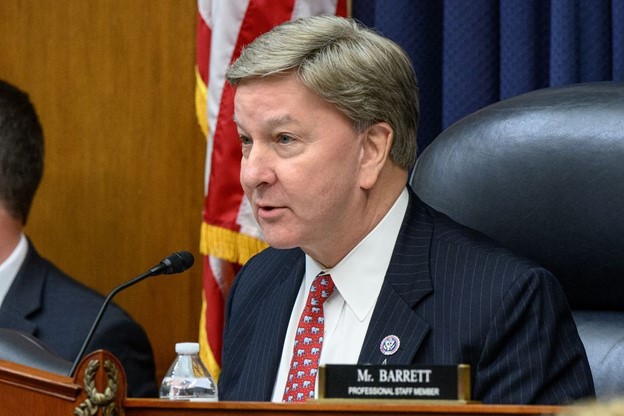Mike Rogers says attacks on Americans will not be tolerated

On Friday, the U.S. launched airstrikes on two targets in Syria. Following the air strikes, Congressmen Mike Rogers (R-Alabama) and Adam Smith (D-Washington), the Chairman and Ranking Member of the House Armed Services Committee, released a joint statement affirming their support for sending a message to Iran and avenging the U.S. service members attacked by Iranian backed terrorists in Syria. “Last night, we were informed that the U.S. military conducted strikes against facilities used by Iran’s Islamic Revolutionary Guard Corps and their proxies in Syria,” Rogers and Smith said. “These strikes come after recent attacks that injured 21 U.S. servicemembers and resulted in the death of one U.S. contractor. We stand united in sending a message to Iran and their terrorist proxies that attacks on Americans will not be tolerated as we continue to work with our partners in the region to avoid escalation of the current conflict.” The two facilities were in eastern Syria and are reportedly used by the Iranian Revolutionary Guards and its proxy militias. The Pentagon says that the strikes were in response to attacks against U.S. troops in the region, the Pentagon announced late Thursday. President Joe Biden ordered U.S. military forces to carry out “self-defense airstrikes” on a weapons storage facility and an ammunition storage area reportedly used by Iran’s Islamic Revolutionary Guard Corps (IRGC) and affiliated groups in eastern Syria. Secretary of Defense Lloyd Austin said in a statement, “Today, at President Biden’s direction, U.S. military forces conducted self-defense strikes on two facilities in eastern Syria used by Iran’s Islamic Revolutionary Guard Corps (IRGC) and affiliated groups. These precision self-defense strikes are a response to a series of ongoing and mostly unsuccessful attacks against U.S. personnel in Iraq and Syria by Iranian-backed militia groups that began on October 17. As a result of these attacks, one U.S. citizen contractor died from a cardiac incident while sheltering in place; 21 U.S. personnel suffered from minor injuries, but all have since returned to duty. The President has no higher priority than the safety of U.S. personnel, and he directed today’s action to make clear that the United States will not tolerate such attacks and will defend itself, its personnel, and its interests.” “The United States does not seek conflict and has no intention nor desire to engage in further hostilities, but these Iranian-backed attacks against U.S. forces are unacceptable and must stop. Iran wants to hide its hand and deny its role in these attacks against our forces,” Sec. Austin continued. “We will not let them. If attacks by Iran’s proxies against U.S. forces continue, we will not hesitate to take further necessary measures to protect our people. These narrowly tailored strikes in self-defense were intended solely to protect and defend U.S. personnel in Iraq and Syria. They are separate and distinct from the ongoing conflict between Israel and Hamas, and do not constitute a shift in our approach to the Israel-Hamas conflict. We continue to urge all state and non-state entities not to take action that would escalate into a broader regional conflict.” The U.S. withdrawal from Afghanistan has not lessened tensions with Iran. Over the weekend, Iran ominously threatened massive attacks if “red lines” are crossed. Mike Rogers is in his 11th term representing Alabama’s Third Congressional District. To connect with the author of this story or to comment, email brandonmreporter@gmail.com.
Mike Rogers and Adam Smith denounce Hamas atrocities as “pure evil and inexcusable”

On Wednesday, Congressmen Mike Rogers (R-AL03) and Adam Smith (D-Washington) released a joint statement denouncing the terrorist attacks on Israel over the last few days. Rogers is the Chairman of the House Armed Services Committee, while Smith is the Ranking Member of the Committee. Collectively, the pair are the most powerful Republican and the most powerful Democrat on the House Committee that oversees all of the armed forces of the United States. “Over the past few days, we have seen the horrific stories, images, and videos depicting the barbarism of Hamas terrorists who attacked Israel,” Rogers and Smith wrote. “These inhumane acts are pure evil and inexcusable – there is no ‘but.’ We urge all nations in the region to join us in our bipartisan call condemning these atrocities, to use their influence to discourage others from taking advantage of this situation, and to make it clear that terrorists and bad actors engaging in or exploiting the conflict will not be tolerated.” According to news reports, over one thousand Israelis have been killed in the attacks. Many of them were women and children – in some cases, asleep in their beds. Another 2,800 were wounded in the unprovoked attacks. According to the White House, at least 14 Americans are among the dead. Over Israelis were taken back to Gaza as prisoners, including some Americans. “We remain deeply concerned for the safety of the American and Israeli hostages held by Hamas terrorists – these hostages must be released,” Rogers and Smith stated. The U.S. carrier battle group led by the U.S.S. Gerald Ford (the newest supercarrier) moved into position off the coast of Israel to serve as a deterrent if anyone should use this moment as a pretext to attack Israel while the Israeli armed forces are preoccupied with dealing with Hamas and Hezbollah. “Hamas didn’t consider the unbreakable spirit and strength of the people of Israel before the attack,” Rogers and Smith concluded. “We are proud to stand shoulder to shoulder with Israel.” President Joe Biden said in a statement, “This morning, I spoke with Prime Minister [Benjamin] Netanyahu about the horrific and ongoing attacks in Israel. The United States unequivocally condemns this appalling assault against Israel by Hamas terrorists from Gaza, and I made clear to Prime Minister Netanyahu that we stand ready to offer all appropriate means of support to the Government and people of Israel. Terrorism is never justified. Israel has a right to defend itself and its people. The United States warns against any other party hostile to Israel seeking advantage in this situation. My Administration’s support for Israel’s security is rock solid and unwavering.” Republicans have criticized Biden for not holding Iran accountable when they are the number one state sponsor of terrorism in the world. Rogers is serving in his eleventh term representing Alabama’s Third Congressional District. To connect with the author of this story or to comment, email brandonmreporter@gmail.com.
Rep. Mike Rogers speaks in support of the FY2024 NDAA

U.S. Representative Mike Rogers, in his role as Chairman of the House Armed Services Committee, spoke on the House Floor in support of the FY2024 National Defense Authorization Act (NDAA). “I rise in strong support of H.R. 2670, the FY24 National Defense Authorization Act,” Chairman Rogers said. “H.R. 2670 represents a truly bipartisan bill. I want to thank Ranking Member [Adam] Smith for his tremendous help in moving this bill through committee.” “Congress has the Constitutional duty to provide for our common defense,” Rogers continued. “Every year, we fulfill that duty by passing the National Defense Authorization Act. The FY24 NDAA provides our warfighters the resources and authorities they need to provide for the defense of our nation and the security of our allies around the world. That’s critical because the threats we face today are more complex and serious than at any point in the last 30 years.” “Topping that list is an increasingly aggressive China,” Rogers added. “Ranking Member Smith and I recently led a bipartisan delegation to Taiwan, Japan, and the Philippines. What was clear from our meetings was that the threat posed by Chinese Communist Party is real and represents the most pressing national security challenge we’ve faced in decades. The FY24 NDAA was built with the underlying goal of deterring the Chinese Communist Party. It provides new authorities and speeds the fielding of innovative new technologies like AI and hypersonics that will give us the advantage in a conflict with China. It strengthens our security partnerships with Taiwan and Pacific allies. It fully funds and expedites the modernization of our nuclear deterrent. It builds a stronger and more capable missile defense. It protects U.S. military bases, critical infrastructure, and academic research from Chinese encroachment and espionage. It builds the logistics network in the Pacific the military needs to carry out operations against China. And it includes new authorities to retool and revitalize the industrial base to ensure they can deliver the systems we need to prevail in any conflict.” “Reorienting our defense to deter the threat from China will be an expensive endeavor,” said Rogers. “But we acknowledge there are limits on what we can afford to spend. That’s why this NDAA is hyper-focused on rooting out waste at the DoD. If weapons systems are not responsive to the threats we face, we cut them. In fact, the NDAA includes nearly $40 billion in savings from cutting systems that can’t survive a conflict with China and by reigning in programs that have grown out of control. We also require the DoD IG to review major defense programs for waste, and we create a new Special Inspector General to oversee all aid to Ukraine.” “In the face of growing threats from China, it’s critical we restore the military’s focus on lethality,” said Rogers. “The FY24 NDAA does so by bringing to an end divisive policies implemented by this administration that have hurt recruiting, unit cohesion, and military readiness. While I believe this will go a long way toward resolving the recruiting crisis we face, we also need to improve the quality of life for our service members and their families. The NDAA does that by providing for the largest pay raise in 30 years and authorizes a bonus for the junior enlisted. It increases allowances for housing and basic needs to counteract growing costs for food and housing. It authorizes $200 million more than the President requested to build new barracks and family housing. The bill expands access and significantly reduces the cost of childcare for military families. It makes it easier for military spouses to find jobs when service members transfer stations. Finally, it improves the quality of military healthcare, especially mental health services for servicemembers and their families.” This bipartisan FY2024 NDAA passed out of the House Armed Services Committee 58 to 1. Roger is in his eleventh term representing Alabama’s Third Congressional District. To connect with the author of this story or to comment, email brandonmreporter@gmail.com.
Congressman Mike Rogers leads bipartisan delegation to Indo-Pacific

House Armed Services Committee Chairman Mike Rogers (R-AL03) was joined by Ranking Member U.S. Rep. Adam Smith (D,-Washington) on a mission to the Indo-Pacific. Joining the two most powerful members of the House Armed Services Committee were U.S. Reps. Joe Courtney (D-Connecticut), John Garamendi (D-California), Gary Palmer (R-AL06), David Rouzer (R-North Carolina), Cory Mills (R-Florida), Jill Tokuda (D-Hawaii), and James Moylan (R-Guam). The delegation visited Hawaii, Guam, the Philippines, Taiwan, and Japan. They met with senior officials at every location to discuss security issues in the Indo-Pacific region. The CODEL was focused on what must be done to maintain a free and open Indo-Pacific and deter aggression by the Chinese Communist Party (CCP). The members released a joint statement on Wednesday following the CODEL: “The national security threat posed by the Chinese Communist Party is the most pressing challenge facing our nation, as well as our allies and partners. On this CODEL, we heard from military and civilian leaders for the U.S., the Philippines, Taiwan, and Japan on what is being done to deter aggression by the CCP and boost defenses for the U.S., allies, and partners in the face of that challenge.” “In Hawaii, we heard from INDOPACOM Commander Admiral John Aquilino and discussed what needs to be done in Guam and throughout the Indo-Pacific to boost U.S. capabilities to deter the CCP. We also saw firsthand, how the U.S. military is working closely with their counterparts in the Philippines and Japan to address a range of security challenges in the region. Throughout our conversations with allies and partners in the region, it was clear that U.S. support is vital. “The critical nature of U.S. support is also apparent in Taiwan. We relayed to President Tsai that U.S. support for Taiwan is unwavering, and we will do all we can to ensure Taiwan gets the assistance it needs. “This CODEL reaffirmed the crucial role the National Defense Authorization Act plays in deterring the CCP’s aggression. We are proud of the bipartisan work happening in Congress to support our national defense.” Congressman Mike Rogers is serving in his eleventh term representing Alabama’s Third Congressional District. To connect with the author of this story or to comment, email brandonmreporter@gmail.com.
Will Sellers: The legacy of Adam Smith

Adam Smith, the anchor of that group of inquisitive Scotsmen who spawned the Scottish Enlightenment and significantly changed the world, was born 300 years ago this month. The era of his birth was still primarily agrarian, with superstition superseding science. He would alter this status by observing his community, pursuing the life of a scholar, and questioning his experiences in the world around him. And…… he wrote his thoughts down. Scotland was ready to nurture the likes of Smith. With an expanding middle class, his community was beginning to prosper and grow. Smith would want for little and had the resources to think about his world and consider both the nature of man and the means to achieve a happy existence. The foundation for his community was based in many respects on the political, social, and legal framework that originated in the Magna Carta. Indeed, the structure established by Magna Carta produced several results that were the basis for a portion of Smith’s theories about wealth and prosperity. Smith was never content to accept the world as he found it. He asked probing questions and considered thoroughly the looming issues of his day. He was a practical academic who would pay close attention to the world around him. He noticed what worked, what failed, and what made people successful. Initially, his observations were contained in academic lectures, which Smith, a prolific writer, eventually turned into books that are still in print and studied today. His first major work was “A Theory of Moral Sentiments,” which was Smith’s attempt to understand and explain human nature. He theorized how people could lead a balanced life between unbridled self-interest within the constraints of self-control but with sympathy and compassion for others. From a view of how individuals lived in a community and how they behaved together, Smith realized that certain principles emerged that created a prosperous environment and happy citizenry. From these observations came the book for which Smith is most famous: “An Inquiry into the Nature and Causes of the Wealth of Nations,” or “Wealth of Nations,” for short. From its publication even until today, the book is quoted, misquoted, and used to justify any number of ideas – both good and bad. Indeed, the problem with writing a philosophical book that is more than 1,000 pages is that there is something for everyone to embrace or reject. And, when read in conjunction with Smith’s other works, like any inquisitive scholar, his “Wealth of Nations” appears inconsistent when taken out of context. Smith was not necessarily an original thinker but had the presence of mind to write down his thoughts. Others might have introduced the idea, but Smith teased our various concepts and risked his reputation by exposing his musings for critique and inquiry. “Wealth of Nations” made numerous observations about the commercial world and posed explanations of prosperity. Smith noticed it made little sense for people to be jacks of all trades and observed that individuals had different skill sets that made them better at some things than others. He posited that once labor was divided into specialized tasks, products were more efficiently produced, prices were lower, and prosperity seemed to abound. His work then encouraged specialization so that industry could produce goods more efficiently. Another observation was the importance of self-interest. Smith detected that the reason people worked hard was to promote their own well-being. This pursuit of selfish aims not only benefited the self-seeker but also created a commercial environment prospering the entire society. He saw trade not as delivering a mere service, or a zero-sum game, but as workers collectively seeking to improve their financial status such that they worked harder to sell more products, which worked to lower prices for consumers. He further reasoned that for a nation to prosper, government should allow as much freedom as possible so that individuals can pursue their self-interest. Smith was concerned that the restraints on industry, be it by regulation or taxation, could reduce productivity. This was a real concern in his day as guilds might restrict by license who could produce what goods at what price. Guilds served to stymie innovation and productivity that occurs when laborers, motivated by profit, develop more efficient means to produce more goods. Smith also saw that taxation from government created disincentives to work hard. If people were taxed too much and lost their hard-earned profits, they would have no reason to find new ways of production and expand their business. So, when Smith looked at Scotland and noticed the prosperity, he reasoned that commercial success from individual employment to business owners was almost magically motivated. He theorized that an invisible hand rewarded a society that had the most freedoms to allow businesses to sell and consumers to buy with few limitations to restrain open and free markets. Another equally critical part of prosperity was having a stable, reliable, and consistent system of justice. Unlike other countries, Scotland had just this. Magna Carta had planted seeds that established legal structures to create economic dynamism in one instance by limiting any infringement on the “ancient liberties and free customs” that allowed trade to flow in and out of London. It further sought to reduce restrictions on the use of waterways to transport goods among cities. Free trade was also supported by requiring a consistent system of weights and measures throughout the land. Adam Smith’s genius was to look around and see why his country was prosperous and speculate on the root causes of economic success. “Wealth of Nations” was not a guide to prosperity, but, rather, it was an observation that if a country, state, or community wants to achieve commercial success, there are obvious means to accomplish it. When grounded in a government that supports specialization and free movement of labor, limits regulation, restrictions, and taxation, and fosters a reliable legal system, a magic, invisible hand almost spontaneously creates commercial success. No wonder his legacy is still debated. Will Sellers is a graduate of
Daniel Sutter: What’s good and bad with DEI

Diversity, Equity, and Inclusion (DEI) initiatives in business and higher education have become controversial. Texas A&M and Texas Tech recently ended DEI statements for faculty hiring and tenure. What is problematic about being welcoming and inclusive? Let’s consider the underrepresentation of women in engineering. According to the National Science Foundation, in 2016, women earned 21 and 24 percent of engineering bachelor’s and doctoral degrees. The disparity exists across white, Black, and Hispanic students. Everyone should be free to pursue the career of their choice regardless of gender or race. Such inclusion, I hope, is not controversial. Historical discrimination calls for extensive efforts to make women feel welcome today. Ivy League universities, for instance, did not admit women until 1969 (Yale). The service academies only admitted women in 1976. Gender segregation did not reflect pure animus. Many educators believed separate men’s and women’s schools facilitated learning. The all-male Ivies had the prestigious Seven Sisters as counterparts, colleges like Barnard and Vassar. Pioneering women in male-dominated fields faced discrimination and harassment. According to a 1960s survey, 90 percent of law firms would not interview women. Pioneers in law enforcement and firefighting had to overcome horrific harassment. Discrimination can yield perceptions of hostility long after reforms. It is not enough to treat women in STEM fields fairly; young women must feel welcome. I favor strongly worded commitments to inclusion by universities and businesses. Will this yield equal representation of men and women in every field? No. Career choices depend on preferences regarding work, which may differ between the sexes. Consider building skyscrapers. This would be a nightmare job for anyone afraid of heights. If more women are afraid of heights than men, the free choices of individuals may yield a male-dominated job, but one in an economy where everyone can choose their career. Alternatively, drafting women afraid of heights to work on high steel to achieve gender balance is preposterous. Once we eliminate legal barriers and harassment, can we attribute any STEM gender disparities to preference differences? Not necessarily. We also must consider the shaping of preferences. Our preferences are at least partially socially constructed, shaped by many influences in our lives. Economists take preferences as given and as reflecting our genuine selves. Suppose young Jack and Jill both want to be rocket scientists. Adults encourage Jack and discourage Jill, who does not choose a STEM career. I think many people fear that these numerous social cues push gender roles on young people. The interpretation of these cues gets to the DEI controversy. Here I mean the programmatic elements of DEI and the academic theories behind them. Consider the research on microaggressions, “brief and commonplace daily … indignities, whether intentional or unintentional…” But as Greg Lukianoff and Jonathan Haidt observe in The Coddling of the American Mind, intention matters significantly in evaluating action; the difference between murder and an accident is intention. DEI programs have evolved from critical theory, the application of Marxist analysis to gender and race instead of economic class. Karl Marx viewed the features of markets as deliberately designed by capitalists. Similarly, critical theory views slights as deliberate aggressive acts designed to discriminate against women. This worldview views all gender or racial disparities as intentional. The alternative to Marx’s deliberate design is Adam Smith’s spontaneous (or emergent or unplanned) order. As one example, money evolved spontaneously as people recognized that trading with stones or gold, or silver made life easier. The cues and prompts shaping preferences reflect the personal values and actions of millions of Americans or an unplanned order. Unplanned orders can be enormously complex, creating the potential for policies to have unintended consequences. Policies can negatively impact the intended beneficiaries. Since the impacts are not intended, we can modify the policies once we recognize the impacts. Welcoming and inclusive universities are desirable. But programmatic DEI, including litmus tests for hiring, threaten to impose one ideology on higher education, impinging on open inquiry. Programs sold under the banner of diversity may enforce conformity. Daniel Sutter is the Charles G. Koch Professor of Economics with the Manuel H. Johnson Center for Political Economy at Troy University and host of Econversations on TrojanVision. The opinions expressed in this column are the author’s and do not necessarily reflect the views of Troy University.
Mike Rogers and Adam Smith announce subcommittee rosters on House Armed Services Committee

On Wednesday, House Armed Services Committee Chairman Mike Rogers and Ranking Member Adam Smith announced the following Chairmen, Ranking Members, and subcommittee rosters for the 118th Congress selected by Chairman Rogers and the Democratic Committee Caucus. “We must ensure that our military focuses on lethality and capability,” Chairman Rogers said. “Over the next two years, the House Armed Services Committee will provide our warfighters with the resources and weapons they need to deter and, if necessary, defeat any adversary anywhere in the world.” Chairman Rogers named Rob Wittman as Vice Chairman, and Ranking Member Smith named Pat Ryan as Vice Ranking Member. Alabama Congress members Terri Sewell and Dale Strong also serve on the Armed Services Committee. “The State of Alabama has long played a central role in advancing U.S. defense capabilities, and as a member of the House Armed Services Committee, I am excited to do my part to support the brave men and women working to keep our nation safe and secure,” said Rep. Sewell. “We in Alabama’s 7th Congressional District are proud to be home to Maxwell Air Force Base, the 187th Fighter Wing, the 117th Air Refueling Wing, and countless men and women in uniform that profoundly serve our country. I look forward to leveraging my position on the Armed Services Committee to advocate for their needs in this new Congress.” “When I was sworn in as your Representative, I took an oath to protect and defend the Constitution,” said Rep. Strong. “My first responsibility is to provide for a strong national defense. Serving on the Armed Services Committee will allow me to directly advocate for the commonsense policies that strengthen our national security and best serve America’s men and women in uniform.” The House Armed Services subcommittee Chairmen, Ranking Members, and rosters, with members listed in order of subcommittee seniority, are as follows: Cyber, Information Technology, and Innovation: Mike Gallagher (R-Wisconsin) – Chairman Matt Gaetz (R-Florida) Lisa McClain (R-Michigan) Pat Fallon (R-Texas) Dale Strong (R-AL05) Morgan Luttrell (R-Texas) Jen Kiggans (R-Virginia) Nick LaLota (R-NY) Rich McCormick (R-Texas) Ro Khanna (D-California) – Ranking Member Seth Moulton (D-Massachusetts) Bill Keating (D-Massachusetts) Andy Kim (D-New Jersey) Elissa Slotkin (D-Michigan) Jared Golden (D-Maine) Pat Ryan (D-New York) Chris Deluzio (D-Pennsylvania) Intelligence and Special Operations: Jack Bergman (R-Michigan) – Chairman Austin Scott (R-Georgia) Elise Stefanik (R-New York) Trent Kelly (R-Mississippi) Ronny Jackson (R-Texas) Nancy Mace (R-South Carolina) Morgan Luttrell (R-Texas) Cory Mills (R-Florida) Ruben Gallego (D-Arizona) – Ranking Member Bill Keating (D-Massachusetts) Jason Crow (D-Colorado) Elissa Slotkin (D-Michigan) Sara Jacobs (D-California) Jeff Jackson (D-North Carolina) Jimmy Panetta (D-California) Military Personnel: Jim Banks (R-Indiana) – Chairman Elise Stefanik (R-New York) Matt Gaetz (R-Florida) Jack Bergman (R-Michigan) Michael Waltz (R-Florida) Brad Finstad (R-Minnesota) James Moylan (R-Guam) Mark Alford (R-Missouri) Cory Mills (R-Florida) Andy Kim (D-New Jersey) – Ranking Member Chrissy Houlahan (D-Pennsylvania) Veronica Escobar (D-Texas) Marilyn Strickland (D-Washington) Jill Tokuda (D-Hawaii) Don Davis (D-North Carolina) Terri Sewell (D-AL07) Steven Horsford (D-Nevada) Readiness: Michael Waltz (R-Florida) – Chairman Joe Wilson (R-South Carolina) Austin Scott (R-Georgia) Mike Johnson (R-Louisiana) Carlos Gimenez (R-Florida) Brad Finstad (R-Minnesota) Dale Strong (R-AL05) Jen Kiggans (R-Virginia) James Moylan (R-Guam) John Garamendi (D-California) – Ranking Member Jason Crow (D-California) Mikie Sherrill (D-New Jersey) Veronica Escobar (D-Texas) Marilyn Strickland (D-Washington) Gabriel Vasquez (D-New Mexico) Jill Tokuda (D-Hawaii) Don Davis (D-North Carolina) Seapower and Projection Forces: Trent Kelly (R-Mississippi) – Chairman Rob Wittman (R-Virginia) Scott DesJarlais (R-Tennessee) Mike Gallagher (R-Wisconsin) Jack Bergman (R-Michigan) Mike Johnson (R-Louisiana) Ronny Jackson (R-Texas) Nancy Mace (R-South Carolina) Jen Kiggans (R-Virginia) Mark Alford (R-Missouri) Joe Courtney (D-Connecticut) – Ranking Member John Garamendi (D-California) Donald Norcross (D-New Jersey) Jared Golden (D-Maine) Sara Jacobs (D-California) Chris Deluzio (D-Pennsylvania) Jimmy Panetta (D-California) Strategic Forces: Doug Lamborn (R-Colorado) – Chairman Joe Wilson (R-South Carolina) Mike Turner (R-Ohio) Elise Stefanik (R-New York) Scott DesJarlais (R-Tennessee) Don Bacon (R-Nebraska) Jim Banks (R-Indiana) Michael Waltz (R-Florida) Dale Strong (R-AL05) Seth Moulton (D-Massachusetts) – Ranking Member John Garamendi (D-California) Donald Norcross (D-New Jersey) Salud Carbajal (D-California) Ro Khanna (D-California) Chrissy Houlahan (D-Pennsylvania) Gabriel Vasquez (D-New Mexico) Tactical Air and Land Forces: Rob Wittman (R-Virginia) – Chairman Mike Turner (R-Ohio) Doug Lamborn (R-Colorado) Sam Graves (R-Missouri) Don Bacon (R-Nebraska) Lisa McClain (R-Michigan) Pat Fallon (R-Texas) Carlos Gimenez (R-Florida) Nick LaLota (R-New York) Rich McCormick (R-Georgia) Donald Norcross (D-New Jersey) – Ranking Member Joe Courtney (D-Connecticut) Ruben Gallego (D-Arizona) Salud Carbajal (D-California) Mikie Sherrill (D-New Jersey) Pat Ryan (D-New York) Jeff Jackson (D-North Carolina) Steven Horsford (D-Nevada) Rogers was elected to his eleventh term representing Alabama’s Third Congressional District. Before his congressional service, Rogers represented Calhoun County in the Alabama State Legislature. Rogers also served on the Calhoun County Commission. He is an attorney. He and his family live in Saks. To connect with the author of this story or to comment, email brandonmreporter@gmail.com.
Terri Sewell appointed to the House Armed Services Committee

On Tuesday, Congresswoman Terri Sewell announced that she has been appointed to serve on the House Armed Services Committee (HASC) in the 118th Congress. This is in addition to her previous appointments to the House Ways and Means Committee and the House Administration Committee. “The State of Alabama has long played a central role in advancing U.S. defense capabilities, and as a member of the House Armed Services Committee, I am excited to do my part to support the brave men and women working to keep our nation safe and secure,” said Rep. Sewell. “We in Alabama’s 7th Congressional District are proud to be home to Maxwell Air Force Base, the 187th Fighter Wing, the 117th Air Refueling Wing, and countless men and women in uniform that profoundly serve our country. I look forward to leveraging my position on the Armed Services Committee to advocate for their needs in this new Congress.” On Twitter, Sewell wrote, “Alabama has long played a central role in advancing U.S. defense capabilities, and as a member of the Armed Services Committee, I’m excited to do my part to support the brave service members working to keep our nation safe and secure!” The Armed Services Committee was created by the Legislative Reorganization Act of 1946, which merged the jurisdictions of the Committee on Military Affairs and the Committee on Naval Affairs. The Committee’s jurisdiction includes defense policy, ongoing military operations, the organization and reform of the Department of Defense and Department of Energy, counter-drug programs, acquisition and industrial base policy, technology transfer and export controls, joint interoperability, the Cooperative Threat Reduction program, Department of Energy nonproliferation programs, and detainee affairs and policy. Congressman Mike Rogers chairs the HASC committee. New Congressman Dale Strong also serves on the House Armed Services Committee. Rep. Adam Smith is the Ranking Democrat on the Committee – Smith chaired the Committee in the 117th Congress when Democrats were in control of the U.S. House of Representatives. Sewell was an attorney for the City of Birmingham prior to her election to represent Alabama’s Seventh Congressional District in 2010. She is a native of Selma and lives in Hoover. To connect with the author of this story, or to comment, email brandonmreporter@gmail.com.
Mike Rogers named Chairman of House Armed Services Committee

Congressman Mike Rogers was named Chairman of the powerful House Armed Services Committee. Rep. Rogers will be the first Congressman from Alabama to serve as Chairman of the committee in history. “I am honored to have been selected by my House Republican colleagues to serve as Chairman of the House Armed Services Committee,” Rogers said in a statement. “Our nation faces unprecedented threats from China, Russia, North Korea, and Iran. In order to deter these threats and remain the most feared force in the world — we must ensure that our military focuses on lethality and capability. Over the next two years, the House Armed Services Committee will provide our warfighters with the resources and weapons they need to deter and, if necessary, defeat any adversary anywhere in the world.” “The committee will also hold the Biden administration accountable for misguided policies that distract from the core mission of the Department of Defense,” Rogers continued. “Initiatives that service a social agenda but don’t advance our national security will be scrutinized. Those in charge of these initiatives will come before the committee to explain how they will protect our national security. We will leave no stone unturned in holding the Biden administration accountable.” “Alabama has always played a critical role in supporting our national security,” Rogers concluded. “As the first Congressman from Alabama to serve as Chairman of the House Armed Services Committee, I look forward to continuing that legacy.” “Congratulations to my friend and colleague @RepMikeRogersAL on being named Chairman of @HASCRepublicans!” Congressman Jerry Carl wrote on Twitter. “I’ve enjoyed serving on Armed Services with Mike and seeing all he’s accomplished for Alabama, and I know he is the leader our nation needs on the committee.” Rogers served as the Ranking Republican member of the Committee during the 117 Congress under then Chairman Adam Smith. Under the rules of Congress, the party that controls the House of Representatives picks the Chairs of virtually all committees. Smith chaired then because Democrats controlled the House. Republicans won control of the House in the 118th Congress, so Rogers moved from being the Ranking member of the minority party to the Chairman’s role on the Committee. On Tuesday, the Pentagon released an order ending the divisive COVID-19 vaccine mandate for members of the armed forces. On Wednesday, Chairman Rogers released a statement applauding the end of the forced COVID-19 shots for military members. “Because of the hard work of House Republicans — the Department of Defense has finally rescinded the harmful COVID-19 vaccine mandate for servicemembers,” Rogers said. “I am proud to have fought for the inclusion of language in the Fiscal Year 2023 James M. Inhofe National Defense Authorization Act that directed the Department of Defense to end this mandate.” “Our work is not done,” Rogers added. “We will be looking into the impacts the COVID-19 vaccine mandate had on our readiness — especially its impact on the recruitment and retention of servicemembers. The House Armed Services Committee will continue to fight for our servicemembers and hold the Biden administration accountable for their harmful and misguided policies.” Rogers and other Republican members of Congress insisted on language being included in the FY2023 National Defense Authorization Act (NDAA), overturning Secretary of Defense Lloyd Austin’s shot mandate. Rogers is serving in his eleventh term representing Alabama’s Third Congressional District. Rogers is an attorney. He previously served as a State Representative and county commissioner. He and his family live in Saks in Calhoun County. To connect with the author of this story, or to comment, email brandonmreporter@gmail.com.
House passes defense bill scrapping COVID vaccine mandate

A bill to rescind the COVID-19 vaccine mandate for members of the U.S. military and provide nearly $858 billion for national defense passed the House on Thursday as lawmakers scratch off one of the final items on their yearly to-do list. The bill provides for about $45 billion more for defense programs than President Joe Biden requested, the second consecutive year Congress significantly exceeded his request, as lawmakers seek to boost the nation’s military competitiveness with China and Russia. The House passed the bill by a vote of 350-80. It now goes to the Senate, where it is expected to pass easily, then to the president to be signed into law. To win bipartisan support for the bill, Democrats agreed to Republican demands to scrap the requirement for service members to get a COVID-19 vaccination. The bill directs Defense Secretary Lloyd Austin to rescind his August 2021 memorandum imposing the mandate. Only days earlier, he voiced support for keeping the mandate in effect. Rep. Adam Smith, Democratic chairman of the House Armed Services Committee, told colleagues that the decision to impose the vaccine mandate was the right call at the time. “It saved lives, and it made sure that our force was as ready as it could possibly be in the face of the pandemic,” Smith said. But, he said the directive only required the initial vaccination, and by now, that protection has worn off. “It’s time to update the policy,” Smith said. Republicans said the mandate hurt recruiting and retention efforts. Rep. Mike Rogers, top Republican on the House Armed Services Committee, said he intends in the next Congress to examine who was adversely affected by the mandate, “so we can try to revisit that and make them whole to the extent desirable.” More than 8,000 active-duty service members were discharged for failure to obey a lawful order when they refused the vaccine. “Some of the folks who have moved on are not going to want to come back,” said Rogers, who will become chairman of the Armed Services Committee in the next Congress. Smith said he opposed efforts to reward those service members who disobeyed a military order. “Orders are not optional in the United States military,” Smith said. “And if Congress expresses the opinion that they are, I cannot imagine anything that would more significantly undermine the good order and discipline within our military.” Military leaders have argued that troops for decades have been required to get as many as 17 vaccines in order to maintain the health of the force, particularly those deploying overseas. Recruits arriving at the military academies or at basic training get a regimen of shots on their first day — such as measles, mumps, and rubella — if they aren’t already vaccinated. And they routinely get flu shots in the fall. Service leaders have said that the number of troops who requested religious or other exemptions to any of those required vaccines — prior to the COVID pandemic — was negligible. The politicization of the COVID-19 vaccine, however, triggered an onslaught of exemption requests from troops. As many as 16,000 religious exemptions have been or are still pending, and only about 190 have been approved. Small numbers of temporary and permanent medical exemptions have also been granted. While the rescission of the COVID-19 vaccine mandate has generated much attention, it takes up one paragraph of what is a 4,408-page bill. The defense policy legislation is critical in shaping the military’s future. It sets the maximum number of service members authorized to be in the various branches of the military. It authorizes money for specific major weapons programs, and it establishes pay and benefits. This year’s bill authorizes money to support a $4.6% pay raise for military members and the Defense Department’s civilian workers. The bill also authorizes $800 million in additional security assistance for Ukraine and calls for a report on whether any gaps exist in the oversight of aid to that country. That addresses the concerns of some Republicans who have been calling for a more detailed accounting of how the money has been spent. The legislation received broad support from House members of both political parties. Opposition came from 45 Democrats and 35 Republicans. Some Democrats said the bill authorized too much defense spending. “While working families are being crushed by inflation, we shouldn’t be spending $45 billion MORE than the President requested,” tweeted Rep. Mondaire Jones, D-N.Y. Rep. Troy Nehls, R-Texas, said stripping the vaccine mandate did not go far enough. “We must rehire these heroes with mandatory backpay,” he said of those who were kicked out for refusing the vaccine order. White House press secretary Karine Jean-Pierre defended the Pentagon’s COVID vaccination policy but said Biden would judge the bill “on its entirety.” “What we think happened here is Republicans in Congress have decided that they’d rather fight against the health and well-being of our troops than protecting them,” Jean-Pierre said. “And we believe that it is a mistake.” The defense policy bill also has a variety of environmental measures, such as legislation to boost healthy choral reefs, enhance marine mammal research and eliminate shark fin sales. Lawmakers failed in some instances to attach their priorities to the bill, such as an effort to prevent federal banking regulators from imposing penalties on banks that offer services to cannabis-related businesses. Also left out was legislation from Sen. Joe Manchin, D-W.V.., to speed permits for natural gas pipelines and other energy projects, including a pipeline project in his home state and Virginia. Republished with the permission of The Associated Press.
Democrats’ letter urges amendment to National Defense Authorization Act

Vetting human rights security cooperation programs is the focus of a letter sent to the House and Senate Armed Services Committees by a pair of Democrats. California Congresswoman Sara Jacobs, Maryland Senator Chris Van Hollen, and 13 other federal legislators are urging the committees to include their amendment that would require vetting of human rights in cooperation programs within the fiscal year 2023 National Defense Authorization Act conference pact. According to the letter sent to Chairman Jack Reed, D-RI; Chairman Adam Smith, D-WA; Ranking Member Jim Inhofe, R-OK; and Ranking Member Mike Rogers, R-AL, members are pushing for House-ratified provisions of the Upholding Human Rights Abroad Act that would, if enacted, close loopholes in the Leahy Laws that would “guarantee human rights vetting” of U.S. security assistance that would prevent taxpayer funds from aiding human rights abusers. “This provision would strengthen the U.S. commitment to human rights by increasing vetting measures to ensure that recipients of U.S. support have not committed human rights violations or violations of international humanitarian law,” the members wrote in the letter. “Consistent with the Department of Defense Leahy Law, this provision allows for the use of a national security waiver.” The members wrote that the provisions would give the flexibility that would “continue to address U.S. national security priorities” that would allow the State Department to “undertake this additional vetting.” “This provision would help prevent civilian harm, ensure partner compliance with human rights, and improve intended long-term outcomes toward good governance, rule of law, peace, and human rights promotion,” the members wrote. The letter was also signed by Senators Dick Durbin, D-Ill; Patrick Leahy, D-VT; and Richard Blumenthal, D-CT; and Representatives Jason Crow, D-CO; Chrissy Houlahan, D-PA; Tom Malinowski, D-NJ; Joaquin Castro, D-TX; Albio Sires, D-NJ; Dina Titus, D-NV; Ted Lieu, D-CA; Colin Allred, D-TX-32; Gerry Connolly, D-VA; and Dean Phillips, D-MN. Republished with the permission of The Center Square.
Dan Sutter: Pencils can teach as well as write

Can we learn economics from a pencil? We can, as one of the great contributions of economic education illustrates. America would be better off if our experts understood the pencil’s lesson. Leonard Read, the founder and long-time president of the Foundation for Economic Education, offered the tale of a humble pencil in his 1958 classic, “I, Pencil.” Economist Milton Friedman retold it in his 1980 PBS series “Free to Choose,” where I first heard it. A pencil was selected as narrator because “the ordinary wooden pencil [is] familiar to all boys and girls.” And yet the simple pencil should “merit your wonder and awe” because “not a single person on the face of the earth knows how to make me.” If you have not heard the pencil’s story, let this sink in for a few moments before proceeding. Mr. Read tells about the pencil’s components – the wood, paint, lead (which is of course graphite, not lead), eraser, and so on. The details were how Everhard Faber made pencils in the 1950s, but the lesson remains timeless. Then the wood came from Oregon was and cut at a California sawmill. The lead used graphite from Sri Lanka and clay from Mississippi. The eraser contained a “rubber-like” product from Indonesia mixed with pumice from Italy. If you think you might know how to make these components, remember that each requires specialized equipment. Do you know how to make saws to cut trees, a railroad to ship the logs, and an ocean freighter to transport graphite and pumice? After laying out these details the pencil asks, “Does anyone wish to challenge my earlier assertion that no single person on the face of this earth knows how to make me?” This brilliant opening prepares for a lesson about spontaneous order. Humans together can produce something no one of us knows how to produce. Economist Adam Smith called this the division of labor, but it is really a division of knowledge. The truth about the pencil should not lead to training thousands of MacGyvers who can make anything. For thousands of years, humans lived in small groups which interacted almost entirely through violence and plunder. Each group used only what its members knew; they barely survived. Economic cooperation allows the use of knowledge discovered by others and more knowledge than any one person can learn. As philosopher Alfred North Whitehead put it, “Civilization advances by extending the number of important operations which we can perform without thinking of them.” Another remarkable aspect of spontaneous order is in command. No one would hold a high school dance without forming a committee to organize the affair. Yet Mr. Read’s pencil was not crafted by “anyone dictating or forcibly directing these countless actions which bring me into being.” Our economic institutions are the products of human action but not human design. This allows incredible complexity and robustness to experiments, like a new business trying to make a new product without prior permission. The enduring lesson of “I, Pencil” is how little any economist can know about the economy. If we do not know how to make a simple pencil, how can we possibly hope to direct the entire economy? Unfortunately, few social scientists take this lesson to heart, suffering instead from what economist Friedrich Hayek called “The Fatal Conceit.” The consequences of this conceit are everywhere. In March 2020 many governors closed “nonessential” businesses. Even if one defined “COVID-19 Essential Services” (as Massachusetts’ order phrased it), how could government officials possibly know all the businesses essential to keeping hospitals open or grocery shelves stocked? A year and a half later we have a shortage economy, with certain items simply no longer available. Many proponents of large, activist government believe that experts can solve all of society’s problems and accuse opponents of being anti-science. Sadly, many experts remain ignorant of the limits of their knowledge. The pencils they use could teach them, if only they listened. Daniel Sutter is the Charles G. Koch Professor of Economics with the Manuel H. Johnson Center for Political Economy at Troy University and host of Econversations on TrojanVision. The opinions expressed in this column are the author’s and do not necessarily reflect the views of Troy University.

